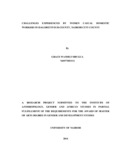| dc.description.abstract | Casual domestic work is a common form of household engagement in Kenya and a much needed
form of livelihood for many. Domestic casual workers are largely women who are in search of
unskilled work that will provide them with a source of income. Women casual domestic workers
are a part of employees of many families in Nairobi and in particular among the urban families;
unfortunately they experience various challenges in their line of duty. They come in handy to
support families in managing their overwhelming domestic chores which include cleaning,
laundry, cooking, and gardening among others. Casual domestic work is currently recognized in
the global frameworks as domestic work under ILO conventions.
The main objective of the study was to establish challenges experienced by women doing causal
domestic worker in Dagoretti Sub-County of Nairobi County. The specific objectives were to
describe the nature of the violations faced by women casual domestic workers; to determine the
socio economic factors contributing to vulnerability of women casual domestic workers; and, to
examine the socioeconomic challenges experienced by women domestic casual workers in their
line of duty. This paper draws from a recent study which was aimed at establishing the
challenges women casual domestic workers experience Dagoretti Sub-County Nairobi City
County.
The study employed qualitative methods of data collection which included key informants
interviews and focus group discussions. The study purposively selected a sample of 20 women
casual domestic workers from Dhobi women group from Dagoretti Sub-County Nairobi County.
From the study it is evident that although Kenya has ratified the International Labour
organizations Convention on Domestic workers, the women casual domestic workers experience
a lot of challenges.
The study findings show that the main socio economic challenges and violations are unwritten
contracts hence the terms of engagement keep changing for the benefit of the employer, low
payments for the workload, delayed payments after the material day despite agreement that
payment would be on daily basis, demands for sexual favours in exchange to their due payments
and working late hence travelling at night back to their homes in the informal settlements. The
study also shows that the socio-economic status of the women makes them more vulnerable to
violations as domestic workers. The casual domestic workers reside in the informal settlements
due to limited income to pay for better housing. Factors like high illiteracy levels made it
difficult to negotiate for better terms with their employers, limited sources of income contributed
to the women taking up the jobs without enquiring much on the terms of engagement as well as
overwhelming financial demands due to their family needs.
The study recommends that the women casual domestic workers should organize themselves into
groups or unions that can facilitate the establishment of policies and regulations of engagement
with employers to reduce vulnerability to various forms of violations. The study also
recommends extensive education of the women casual domestic workers on negotiation skills to
be used with employers, the existing legal frameworks and provisions in the event of violations.
The study further recommends that the women casual domestic workers should set the minimum
pay per daily casual work that would be used in their engagement with their employers. | en_US |

